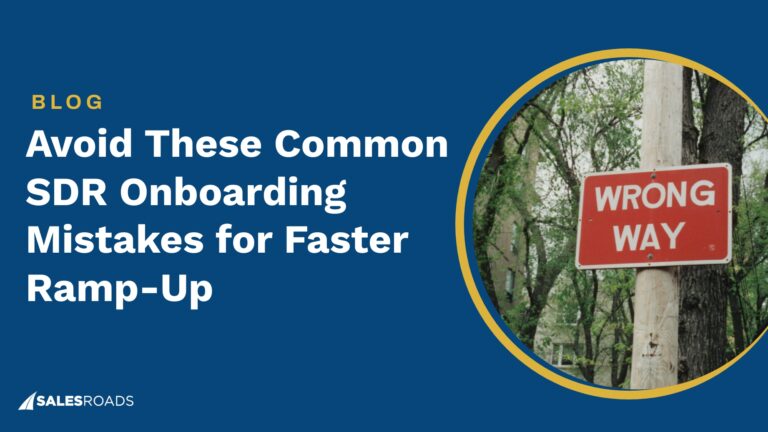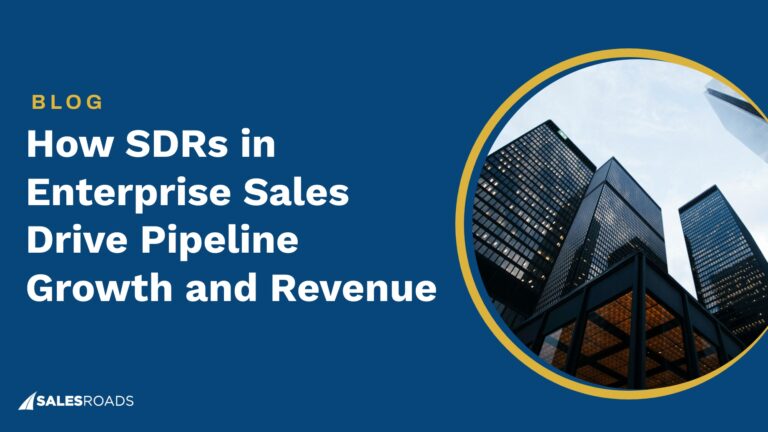Enterprise sales development managers lead and coordinate teams that sell products and services to large organizations. Salespeople use the term “enterprise” to describe this type of sale because it typically involves large companies with over 1,000 employees and millions of dollars in revenue.
Sales development managers in charge of enterprise products are highly specialized individuals with a knack for navigating complex sales processes. They are vital to implementing sales strategies that convert leads into high-paying clients.
Enterprise clients are important for businesses because they help to
- Grow revenue
- Build brand credibility
- Develop long-term relationships
Grow revenue
Enterprise deals are high-value transactions, and the revenue generated from them can make a significant difference for businesses. Profit margins and consistent revenue from enterprise sales enable businesses to grow.
Build brand credibility
Working with large organizations with a global presence can help build your company’s reputation. This complements your testimonials and other social proof, drawing in more high-net-worth clients.
Develop long-term relationships
Businesses are more likely to sign longer contracts when they see ongoing value in your products and services. This means that your company will generate more revenue over an extended period.
The Challenges of Enterprise Sales
Selling to large organizations has different challenges than selling to small businesses. The enterprise sales process is more complex and will require a steady hand to manage.
David Kreiger, President of SalesRoads, talks with David Rubinstein about measuring enterprise performance for scaling sales.
Enterprise sales are challenging because they have
- Longer sales cycles
- Multiple decision-makers
- Little room for error
Longer sales cycles
Due to the organization’s size, closing an enterprise sale can take months or even a year. The length of the transaction is also influenced by its value; the higher the value, the longer it takes.
Multiple decision-makers
Enterprises have complex structures, and all managers and directors must approve your proposal before the deal closes. This bureaucratic feature raises the risks of the transaction and reduces its chances of success.
Little room for errors
In enterprise sales, every move, every meeting, and every proposal counts. Failure to put the best foot forward at any stage can cost you the deal.
Roles and Responsibilities of an Enterprise Sales Development Manager
An enterprise sales development manager is responsible for motivating sales representatives to exceed sales targets and increase revenue.
Daily roles include:
- Prospect and qualify new enterprise leads
- Manage outbound communication with decision-makers
- Monitor leads as they move through the pipeline
- Set sales targets and supervise SDRs to meet them
- Hire and train SDRs
- Collaborate with AEs to find new opportunities
- Handle customer complaints
- Prepare sales reports for management
Skills for Enterprise Sales Managers
Aside from sales prospecting, communication, and coaching, sales managers must develop the right skills for the enterprise sales process. Successful enterprise SDMs have mastered the following abilities:
- Presentation skills
- Relationship building
- Teamwork
Presentation skills
Enterprise clients expect a clear value proposition and a comprehensive presentation of your product or service. Sales managers must master the art of presenting ideas and demonstrating business value through compelling visuals and storytelling.
Relationship building
Enterprise sales is a long game, and sales managers should be patient with it. Because of the lead volume, SDMs dealing with individuals or small businesses may not need to develop a relationship with every single one of them. Enterprise salespeople, on the other hand, must cultivate strong relationships with leads to achieve favorable outcomes.
Teamwork
Getting a company to patronize your business takes a team effort. The enterprise SDM is in charge of this collaboration, and their ability to manage these interactions determines the success of the sale.
Enterprise Sales Development Manager Salary
According to Glassdoor, Zippia, and Salary.com, the average compensation for an enterprise sales manager is $131,201.
| Glassdoor* | Zippia* | Salary.com* |
| $133,524 | $145,551 | $114,528 |
The available data shows that the base salary for this role ranges from $80,000 to $140,000 per year, with bonuses and additional compensation reaching up to $40,000 per year.
Variables affecting enterprise sales development managers’ salaries are:
- Location
- Experience
- Education
Location
The cost of living affects how much employers pay for a role. Enterprise sales development managers in densely populated metropolitan areas are likely to earn more.
According to CompGuage’s compensation report shown below, enterprise SDMs in San Francisco earn more than those in other US cities.
| Location | Avg. Enterprise SDM Compensation |
| San Francisco | $204,000 |
| New York | $193,000 |
| Chicago | $173,000 |
| Atlanta | $150,000 |
| Washington, D.C. | $141,000 |
| Los Angeles | $140,000 |
| Philadelphia | $96,000 |
Experience
Experience in sales development is a crucial factor for salary negotiations. Businesses consider candidates with more experience to be more qualified for this position and will compensate them accordingly.
| Years of Experience | Avg. Base Salary | Additional compensation | Total |
| 0 – 1 | $75,725 | $38,403 | $114,129 |
| 1 – 3 | $84,607 | $38,926 | $123,533 |
| 4 – 6 | $90,470 | $39,967 | $130,436 |
| 7 – 9 | $97,329 | $41,168 | $138,497 |
| 10 – 14 | $110,829 | $42,924 | $153,753 |
| 15 + | $124,192 | $43,777 | $167,969 |
Education
Research shows that 79% of enterprise sales development managers have a bachelor’s degree, while only 14% have a master’s degree or an MBA.
Higher education levels and additional certifications result in higher pay for enterprise SDMs. Data from salary.com shows the following:
| Level of Education | Average Salary* |
| Bachelor’s Degree | $114,000 |
| Master’s Degree/MBA | $116,000 |
| Doctorate Degree | $120,000 |
Outsourcing Sales Development: A Cost-effective Solution for Enterprise Sales
Sales outsourcing is the process of hiring a third party for specific sales tasks. You can choose to outsource to professional individuals or sales agencies.
Businesses often decide to outsource sales if they are unable to afford the cost, lack the necessary expertise, or if the tasks are not scalable.
Hiring an agency is a great option for finding teams highly specialized in producing positive outcomes for businesses. Companies can leverage an outsourcing agency’s experience, expertise, methods, and timely process analysis to ramp up sales and grow revenue.
Outsourcing sales to a reputable agency is less expensive than assembling an in-house team. To build a sales department, you’ll incur fixed costs such as SDR and enterprise sales manager salaries, tool subscriptions, and training expenses; besides running costs for electricity and office equipment.
The average compensation of an SDR is about $75,000. Therefore:
In-house team costs = ($75,000 for each SDR) + ($131,201 for an SDM) + Tools
+ Training expenses + running costs
These costs represent a significant investment compared to outsourcing sales to a third-party agency.
Bottom Line
Enterprise SDMs play a critical role in securing high-value clients and positioning businesses for long-term growth. They have the necessary skills and knowledge to navigate the complexities of enterprise sales, but hiring them can be costly. Outsourcing this task to a third-party agency or individual is a cost-effective and efficient option.
To maximize revenue and minimize costs in the long run, sales leaders can outsource enterprise sales to a reliable appointment-setting company. Outsourcing capitalizes on the expertise of enterprise sales teams to produce exceptional results.











